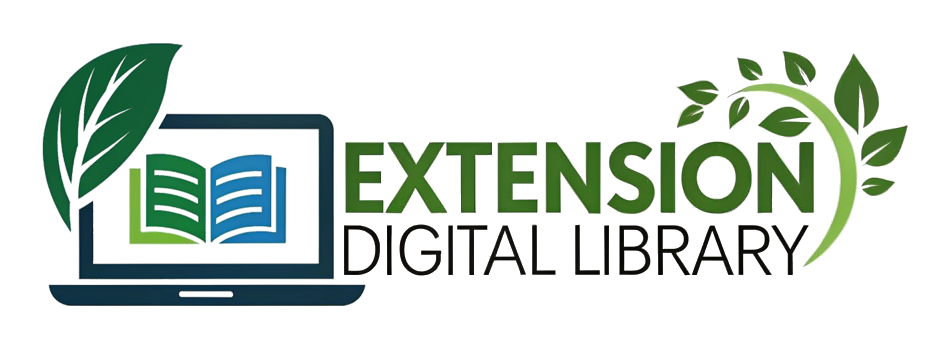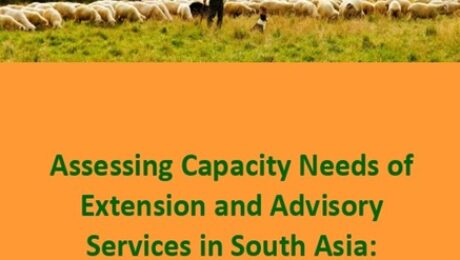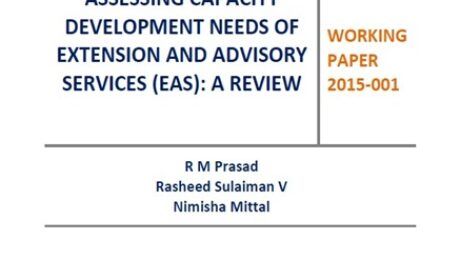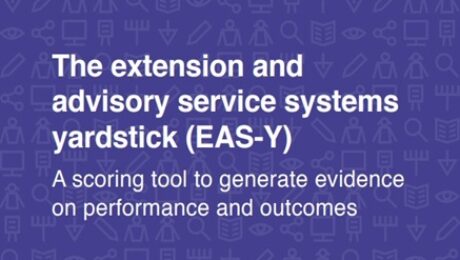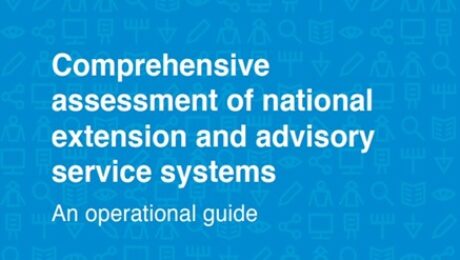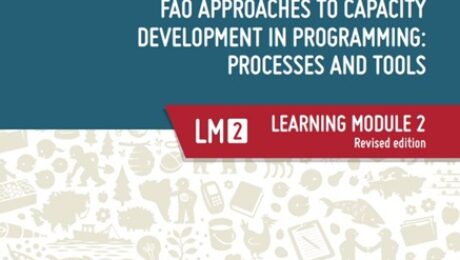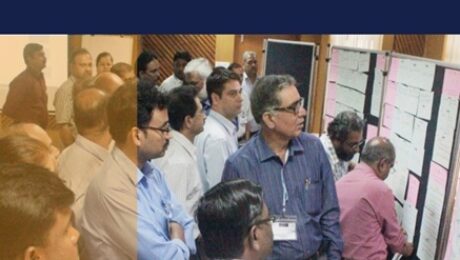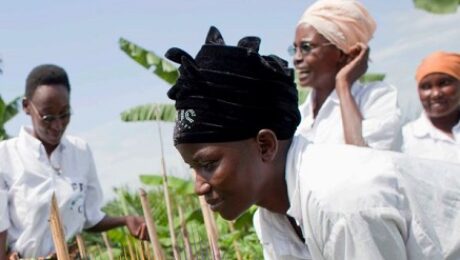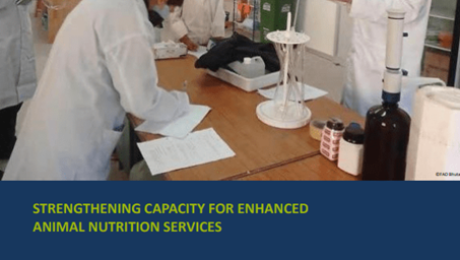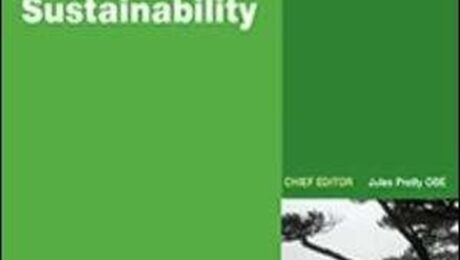Assessing Capacity Needs of Extension and Advisory Services in South Asia: SYNTHESIS REPORT
In the past few years, capacities in EAS to perform their traditional roles such as training and communication of technical information have eroded. Meanwhile, the extension landscape has become increasingly pluralistic with greater participation of the private sector. All these warrant new knowledge, skills, and expertise among EAS providers.
- Published in CAPACITY DEVELOPMENT
Assessing Capacity Development Needs of Extension and Advisory Services (EAS): A Review
The Global Forum for Rural Advisory Services (GFRAS) has articulated a new vision for Extension and Advisory Services (EAS) within the Agricultural Innovation Systems (AIS). This vision articulated in its position paper, called “New Extensionist”, argues for an expanded role for EAS (Box 1) within AIS and development of new capacities at different levels. The motive behind the development of ‘New Extensionist’ comes from the realisation that the existing EAS need new capacities to respond effectively to the emerging challenges in agricultural development (declining water availability, increasing soil degradation, and changing and uncertain climate and markets). In the past few years, capacities in EAS to perform their traditional roles such as training and communication of technical information have eroded. Meanwhile, the extension landscape has become increasingly pluralistic with greater participation of the private sector. All these warrant new knowledge, skills, and expertise among EAS providers.
- Published in CAPACITY DEVELOPMENT
A Scoring Tool to Generate Evidence on Performance and Outcomes-FAO 2022
To enable evidence based and informed policy and investment decision for extension and advisory systems, the EAS-Yardstick (EAS-Y) has been developed through a consultative expert process. It constitutes a holistic scoring tool based on a comprehensive set of metrics that can capture all the nuances of the pluralistic EAS. Metrics are organized into two modules, related to EAS performance and to EAS outcomes, each subdivided into key EAS topics. These cover elements of the EAS enabling environment, scope and provision of services, and coordination, collaboration and learning in the system. At the outcome level, topics include the acquisition of skills, changes in behaviours and livelihood transformations. All metrics are operationalized through a scoring mechanism. EAS-Y is digitally enabled through the Kobo toolbox and is used for participatory assessments in various contexts. Assessments can support a systematic cross country analysis, complementing findings from more specific impact evaluations of EAS interventions or in-depth process evaluations. As such, it contributes to substantially enhance EAS system performance and outcomes by guiding investment and policy decisions.
- Published in CAPACITY DEVELOPMENT, MONITORING & EVALUATION
Comprehensive Assessment of National Extension and Advisory Service Systems- An operational guide FAO (2022)
Extension and advisory services (EAS) play a key role in facilitating innovation processes, empowering marginalized groups through capacity development, and linking farmers with markets. EAS are increasingly provided by a range of actors and funded from diverse sources. With the broadened scope of EAS and the growing complexity of the system, the quantitative performance indicators used in the past (for example related to investment, staffing or productivity) are no longer adequate to assess the performance of EAS systems. This operational guide meets the longstanding demand for guidance on undertaking such a comprehensive assessment of national EAS systems. It provides detailed directions on how to organize the entire process, from preparation to implementation and consolidation. Its use will help identify gaps and entry points for targeting investments and realigning policies for transforming EAS.
- Published in CAPACITY DEVELOPMENT, MONITORING & EVALUATION
The New Extensionist Core Competencies for individuals
Following the publication of the New Extensionist, the GFRAS Consortium on Education and Training collected existing curricula used in different countries, conducted an analysis of the competencies that the curricula focused on and organised consultations with experts to identify the core competencies needed in extension today. The experts then agreed on a listing of core competencies that the New Extensionist professional should have. This brief has these details.
- Published in CAPACITY DEVELOPMENT
FAO Approaches to Capacity Development in Programming: Processes and Tools
This FAO learning module is part of a series designed to strengthen Capacity Development (CD) in agricultural and development programming. It provides practical guidance, processes, and tools to help practitioners incorporate effective capacity-focused strategies into projects and programmes. The content supports FAO staff, partners, and stakeholders in assessing existing capacities, identifying gaps, setting clear objectives, and designing interventions that enhance sustainable capacities at the individual, organizational, and systemic levels. The module emphasizes engagement with national and local actors, context analysis, participatory design, and monitoring of capacity outcomes — all aimed at improving long-term development results.
- Published in CAPACITY DEVELOPMENT
Assessing Capacity Needs Of Extension and Advisory Services a Guide for Facilitators
The Global Forum for Rural Advisory Services (GFRAS) has articulated a new vision for Extension and Advisory Services (EAS) within the Agricultural Innovation Systems (AIS). This vision, articulated in its position paper, called The “New Extensionist”, argues for an expanded role for EAS (Box 1) within AIS and development of new capacities at different levels. The motive behind the development of The “New Extensionist” comes from the realisation that the existing EAS needs new capacities to respond effectively to the emerging challenges in agricultural development (declining water availability, increasing soil degradation, and changing and uncertain climate and markets). In the past few years, EAS’ capacities to perform their traditional roles, such as training and communication of technical information, have eroded. Meanwhile, the extension landscape has become increasingly pluralistic with greater participation of the private sector.
- Published in CAPACITY DEVELOPMENT
Developing capacities in agricultural innovation systems: scaling up the Tropical Agriculture Platform Framework”: the EU-funded TAP-AIS project
The TAP-AIS project is funded by the European Union (EU) and implemented by the Food and Agriculture Organization (FAO) of the United Nations.
The project evolves from the experience of the EU-funded Capacity Development for Agricultural Innovation Systems (CDAIS) project, which successfully tested and validated the TAP Common Framework on capacity development for agricultural innovation systems in eight countries (Angola, Bangladesh, Burkina Faso, Ethiopia, Guatemala, Honduras, Laos and Rwanda).
The TAP-AIS project is developed under the EU initiative “Development Smart Innovation through Research in Agriculture (DeSIRA): Towards climate-relevant Agricultural and Knowledge Innovation Systems”.
The objective of DeSIRA is to contribute to climate-relevant, productive and sustainable transformation of agriculture and food systems in low and middle-income countries.
DeSIRA supports research and innovation projects in Africa, Asia, Latin America and contributes primarily to the achievement of the following SDGs.
- Published in CAPACITY DEVELOPMENT, EXTENSION AND INNOVATION
Strengthening Capacity for Enhanced Animal Nutrition Services
Bhutanese farmers practise mixed farming, with crops and livestock rearing forming an integral part of their livelihoods, particularly in rural communities At farmers’ level, agriculture, livestock and forest interventions are integrated farmers depend on livestock for manure for soil fertility, and dairy products for nutrition and income, while forests provide feed and fodder for animals, timber for construction, wood for heating and cooking, and non wood forest products for consumption and sale Communities in higher altitudes depend more on livestock as the farming of crops has limited scope In semi urban areas, commercial dairy and other livestock products have also emerged with improved breeds Animal nutrition has thus become more important than ever before The only animal nutrition laboratory ( equipped to analyse feed and fodder samples in the country is in Jakar in north central Bhutan However, the laboratory lacks capacity in terms of both institutional and human resources Owing to insufficient government funding, the ANL is not fully functional and, despite the important national mandate of the laboratory, the government has not been able to equip it adequately, nor train personnel to carry out important feed analysis functions Some of the existing equipment is obsolete and not serviceable, while laboratory staff members have not received adequate training in the use of the laboratory facilities The ANL needs equipment for the analysis of feed and fodder samples Training and refresher courses are also required to ensure that laboratory staff members are kept abreast of the latest developments in livestock nutrition.
- Published in CAPACITY DEVELOPMENT, LIVESTOCK / FISHERIES
Capacity building towards agricultural sustainability in the Maldives
A recent study undertaken in the Maldives investigated agricultural stakeholders’ views on capacity building towards sustainable agriculture. In this study, the views of 373 stakeholders were analysed and coded. Ten codes emerged from the data analysis, two of which are the subject for discussion in this paper. The first of the two codes examined stakeholders’ understanding of the term ‘sustainable agriculture’ and, the second code examined understanding of the term ‘building capacity in agriculture’. The two codes revealed a converging view amongst farmers that agricultural sustainability was inextricably linked to profitability. This was underpinned by increased production capacity fuelled by enhanced access to inputs and markets. Farmers further noted that the best vehicle through which capacity building towards profitability could be achieved was that of individualistic farming activity, either as sole farmers or family farming units. Conversely, the study noted that institutional agricultural capacity building interventions had a softer focus on profitability. Such interventions generally concentrated on improving islanders’ livelihoods and building food security through the establishment of collective producer and marketing cooperatives. This paper examines why intervention slippages occurred and suggests their recalibration in favour of assisting individualistic farming units in building capacity towards profitability and agricultural sustainability.
- Published in CAPACITY DEVELOPMENT
- 1
- 2
